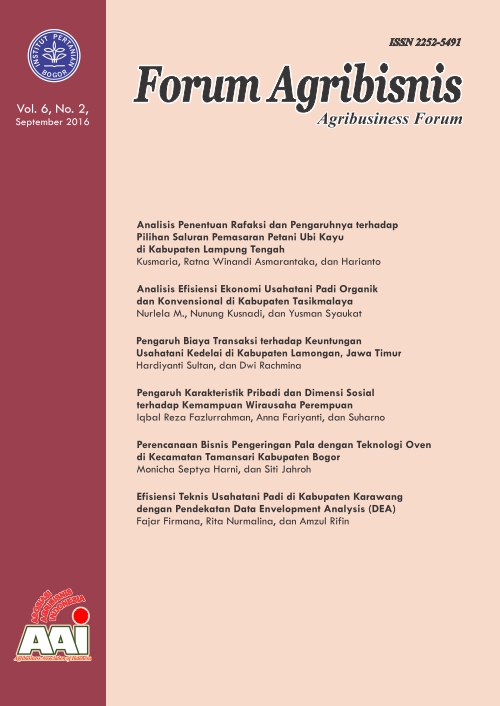ANALISIS EFISIENSI EKONOMI USAHATANI PADI ORGANIK DAN KONVENSIONAL DI KABUPATEN TASIKMALAYA
Main Article Content
Abstract
The purpose of this study was to analyze the economic efficiency of organic rice farming compared conventional rice farming. This study conducted using a cross section data from 100 farmers in Tasikmalaya Regency. The farmers are selected using proportionate stratified random sampling technique which is divided into equal size of two levels. Study was performed using stochastic frontier production function and estimated by Maximum Likelihood Estimation (MLE) method. The result showed that the mean economic efficiency of the organic farmers (0,53) is higher compared conventional farmers (0.43). Cost saving of seed and high production in organic farming as a source of gain in economic efficiency. Knowledge on the factors influencing farm efficiency is crucial for policy makers to improving efficiency levels.
Downloads
Article Details
How to Cite
MachmuddinN., KusnadiN., & SyaukatY. (2017). ANALISIS EFISIENSI EKONOMI USAHATANI PADI ORGANIK DAN KONVENSIONAL DI KABUPATEN TASIKMALAYA. Forum Agribisnis : Agribusiness Forum , 6(2), 145-160. https://doi.org/10.29244/fagb.6.2.145-160
Section
Articles
The author submitting the manuscript must understand and agree that the copyright of the article manuscript must be submitted/transferred to the Journal Forum Agribisnis. This work is licensed under the Creative Commons Attribution-ShareAlike 4.0 (CC BY-SA) International License in which the Author and Reader can copy and redistribute the material in any media or format, and remix, modify and build material for any purpose, but they must provide appropriate credit (citing articles or content), provide a link to the license, and indicate whether there is a change. If you mix, change, or create material, you must distribute your contribution under the same license as the original.
References
Abedullah, Bashir Ahmad and Khuda Bakhsh, 2006. Technical efficiency and its determinants in potato production, evidence from Punjab, Pakistan. The Lahore J.Economics 11 : 2 (Winter 2006) pp 1-22.
Akinbode, S.O., Dipeolu A.O., and Ayinde I.2011. An Examination of technical, allocative and economic efficiencies in ofada rice farming in Ogun State Nigeria. African J.Agricultural Research . Vol.6 (28),pp 6027-6035.
Asogwa, Joseph, and Simon.2011.Economic Efficiency of Nigerian Small Scale Farmers.J Economics,2(2) : 89-98 (2011).
Asrulhoesein. 2010. Proyeksi Produksi dan Padi Organik di Indonesia. Majalah Media Infokom Semai. Bogor: Lembaga Pertanian Sehat (LPS) Dompet Dhuafa.
Coelli, T., D.S.P. Rao and G.E. Battese. 1998. An introduction to efficiency and productivity analysis. Kluwer Academic Publishers, Boston.
[Deptan] Departemen Pertanian. 2007. Road map pengembangan pertanian borganik 2008–2015. http://pphp.deptan.go.id. Diakses 2012 Juni 26.
[Diperta] Dinas Pertanian Tanaman Pangan Jawa Barat. 2015. Beras organik berwarna warni [internet]. Agustus 2010; http://www.diperta.jabarprov.go.id Diakses 27 Februari 2015.
Gultom L.2014.Analisis efisiensi teknis usahatani padi semi organik di Kecamatan Cigombong Kabupaten Bogor [tesis]. Program Pascasarjana Institut Pertanian Bogor, Bogor.
Kusnadi N, Tinaprilla N, Susilowati, dan Purwoto. 2011. Analisis efisiensi usahatani padi di beberapa sentra produksi padi di Indonesia. JAE,29 (1):25-48.
Nurani L E. 2014. analisis efisiensi teknis padi organik di Kabupaten Bogor [tesis]. Program Pascasarjana Institut Pertanian Bagor, Bogor.
Ogundari K, Ojo.SO.2008. An examination of tecnical, economic, and allocative efficiency of small farms : the case studyof cassava farmers in Osun State of Nigeria. Bulgarian Journal of Agricultural Science.13 (2008):185-195.
Prayoga, A. 2010. Produktivitas dan Efisiensi Teknis Usahatani Padi Organik Lahan Sawah. JAE, 28(1): 1-16.
[PUSLITBANG] Pusat Penelitian dan Pengembangan Tanaman Pangan. Peningkatan Produksi Padi Menuju 2020. http://www.puslittan.bogor.net/ diakses pada tanggal 12 April 2015.
Sumaryanto, S., Siregar, M., dan Wahidah, W. 2003. Determinan Efisiensi Teknis Usahatani Padi di Lahan Sawah Irigasi. Jurnal Agro Ekonomi,21(1) :72 -96.
Tien. 2011. Analisis efisiensi teknis usahatani padi sawah aplikasi pertanian organik. El-Hayah Vol. 1 (4) : 182-190.
Tiedemann T and Uwe L.2012.Production risk and tecnical efficiency in organic and conventional agriculture-the case of arable farms in Germany. Journal of Agricultural Economics.2012,Vol.64(2):73-96.
Yasin M, Ashfaq, Adil, and Bakhsh.2014.Profit efficiency of organic vs conventional wheat production in rice-wheat zone of Punjab, Pakistan. J. Agric. Res.52(3):431-452.
Akinbode, S.O., Dipeolu A.O., and Ayinde I.2011. An Examination of technical, allocative and economic efficiencies in ofada rice farming in Ogun State Nigeria. African J.Agricultural Research . Vol.6 (28),pp 6027-6035.
Asogwa, Joseph, and Simon.2011.Economic Efficiency of Nigerian Small Scale Farmers.J Economics,2(2) : 89-98 (2011).
Asrulhoesein. 2010. Proyeksi Produksi dan Padi Organik di Indonesia. Majalah Media Infokom Semai. Bogor: Lembaga Pertanian Sehat (LPS) Dompet Dhuafa.
Coelli, T., D.S.P. Rao and G.E. Battese. 1998. An introduction to efficiency and productivity analysis. Kluwer Academic Publishers, Boston.
[Deptan] Departemen Pertanian. 2007. Road map pengembangan pertanian borganik 2008–2015. http://pphp.deptan.go.id. Diakses 2012 Juni 26.
[Diperta] Dinas Pertanian Tanaman Pangan Jawa Barat. 2015. Beras organik berwarna warni [internet]. Agustus 2010; http://www.diperta.jabarprov.go.id Diakses 27 Februari 2015.
Gultom L.2014.Analisis efisiensi teknis usahatani padi semi organik di Kecamatan Cigombong Kabupaten Bogor [tesis]. Program Pascasarjana Institut Pertanian Bogor, Bogor.
Kusnadi N, Tinaprilla N, Susilowati, dan Purwoto. 2011. Analisis efisiensi usahatani padi di beberapa sentra produksi padi di Indonesia. JAE,29 (1):25-48.
Nurani L E. 2014. analisis efisiensi teknis padi organik di Kabupaten Bogor [tesis]. Program Pascasarjana Institut Pertanian Bagor, Bogor.
Ogundari K, Ojo.SO.2008. An examination of tecnical, economic, and allocative efficiency of small farms : the case studyof cassava farmers in Osun State of Nigeria. Bulgarian Journal of Agricultural Science.13 (2008):185-195.
Prayoga, A. 2010. Produktivitas dan Efisiensi Teknis Usahatani Padi Organik Lahan Sawah. JAE, 28(1): 1-16.
[PUSLITBANG] Pusat Penelitian dan Pengembangan Tanaman Pangan. Peningkatan Produksi Padi Menuju 2020. http://www.puslittan.bogor.net/ diakses pada tanggal 12 April 2015.
Sumaryanto, S., Siregar, M., dan Wahidah, W. 2003. Determinan Efisiensi Teknis Usahatani Padi di Lahan Sawah Irigasi. Jurnal Agro Ekonomi,21(1) :72 -96.
Tien. 2011. Analisis efisiensi teknis usahatani padi sawah aplikasi pertanian organik. El-Hayah Vol. 1 (4) : 182-190.
Tiedemann T and Uwe L.2012.Production risk and tecnical efficiency in organic and conventional agriculture-the case of arable farms in Germany. Journal of Agricultural Economics.2012,Vol.64(2):73-96.
Yasin M, Ashfaq, Adil, and Bakhsh.2014.Profit efficiency of organic vs conventional wheat production in rice-wheat zone of Punjab, Pakistan. J. Agric. Res.52(3):431-452.

